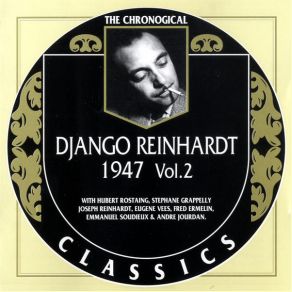The Chronological Django Reinhardt: 1947, Vol. 2
Download links and information about The Chronological Django Reinhardt: 1947, Vol. 2 by Django Reinhardt. This album was released in 1999 and it belongs to Jazz, World Music genres. It contains 20 tracks with total duration of 57:34 minutes.

|
|
|---|---|
| Artist: | Django Reinhardt |
| Release date: | 1999 |
| Genre: | Jazz, World Music |
| Tracks: | 20 |
| Duration: | 57:34 |
| Buy it NOW at: | |
| Buy on iTunes $7.99 | |
Tracks
[Edit]| No. | Title | Length |
|---|---|---|
| 1. | September Song | 3:19 |
| 2. | Brazil | 2:50 |
| 3. | I'll Never Smile Again | 2:41 |
| 4. | New York City | 2:36 |
| 5. | Django's Blues | 3:07 |
| 6. | Love's Mood | 3:07 |
| 7. | I Love You | 2:54 |
| 8. | Nuages | 3:24 |
| 9. | Minor Swing | 2:50 |
| 10. | Stockholm | 3:18 |
| 11. | Topsy | 3:06 |
| 12. | Moppin' the Bride | 2:20 |
| 13. | Insensiblement | 3:15 |
| 14. | Mano | 2:53 |
| 15. | Blues Primitif | 2:44 |
| 16. | Gypsy With a Song, Pt. 2 | 2:58 |
| 17. | Gypsy With a Song, Pt. 2 | 3:03 |
| 18. | Douce Ambiance | 2:22 |
| 19. | What Is This Thing Called Love? | 2:10 |
| 20. | Ol' Man River | 2:37 |
Details
[Edit]The combination of an early modern jazz clarinet and the Quintet of the Hot Club of France creates a special kind of chemistry that occurs periodically throughout Django Reinhardt's recorded works. This volume in the Classics Reinhardt chronology contains an unusually high concentration of clarinetists, most notably the great Hubert Rostaing. Given his warm, personable timbre and unusual dexterity, it is surprising that more jazz lovers are not aware of this remarkable musician. The previous Django Reinhardt installment in the Classics chronology, 1947, contained no less than 13 tracks documenting the Rostaing/Reinhardt collaboration. 1947, Vol. 2 (Classics 1046) forks over 15 more examples of their best work together, along with two tracks featuring clarinetist Maurice Meunier and one greasy strut — "Douce Ambiance" — involving clarinetist Gerard Leveque. Reinhardt, heard playing electric guitar on all but three of the 20 tracks, sounds as lyrical and inventive as ever. "Brazil," unlike most other peoples' renditions, uses hardly any percussion, zeroing in on the melody first and foremost. It is interesting to hear Reinhardt's interpretation of "Topsy," a jam structure invented by Count Basie and Eddie Durham, who pioneered the newfangled electrified guitar back in 1938. "Gypsy With a Song" is Reinhardt's teasing response to Duke Ellington's beautiful composition "Gypsy Without a Song." The disc finishes off with two fine selections from a Quintet session involving Stéphane Grappelli. The rest of the material recorded on that date — November 14, 1947 — can be found on Classics 1317, which chronicles the years 1947-1951.